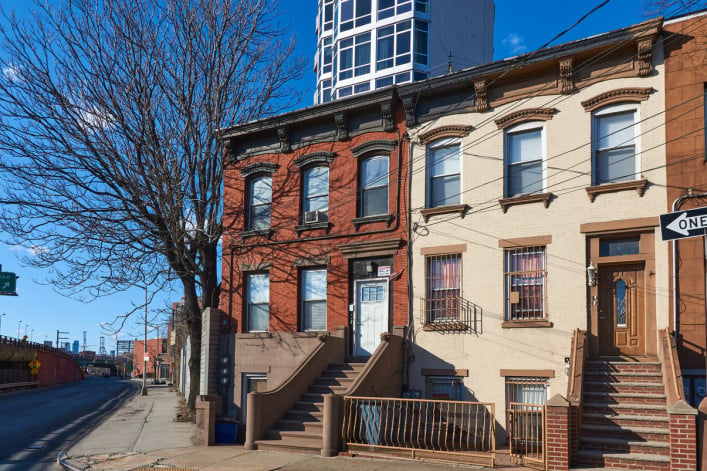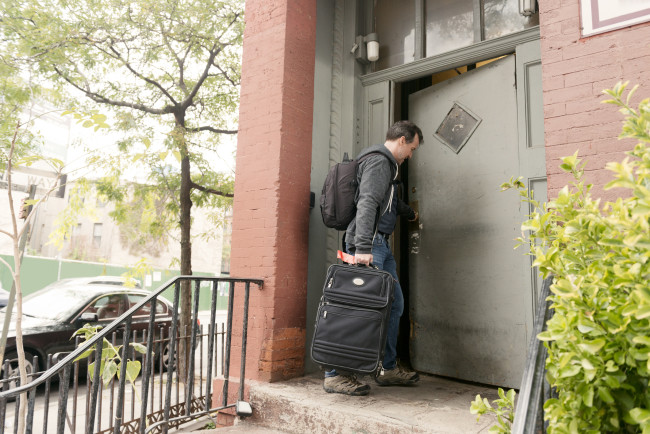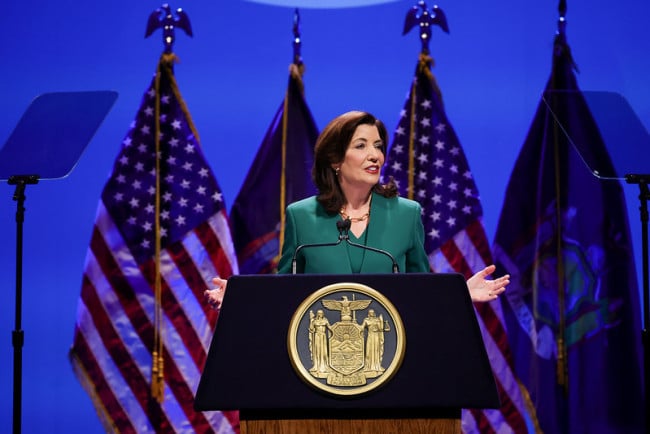Owners and tenant advocates clash over short-term rental bill for houses
- The new bill would allow stays of fewer than 30 days at single- and two-family properties
- Airbnb has reportedly spent $1 million on a lobbying campaign to support the measure

A coalition of tenant and advocacy groups, Tenants Not Tourists, has financial support from the powerful Hotel and Gaming Trades Council and is currently running a "six-figure television ad.”
iStock
There’s a lot of hype about a City Council bill that would roll back New York City’s rules on short-term stays at single- and two-family properties, but council members who are sponsors of the legislation appear reluctant to discuss it with the media.
It’s a sign of just how controversial short-term rentals are in NYC—and the big money being spent to amplify both sides of the debate.
The legislation, Intro 1107, would allow stays of fewer than 30 days at single- and two-family properties. It would also increase the number of adults on a reservation to four from two, allow hosts to restrict some areas from guests, and remove a requirement for the host to be physically present during the stay—the latter has been a de facto ban for hosts, owners told Brick.
Opponents square off
Airbnb has spent $1 million on a lobbying campaign in support of the bill (and $5 million to help elect home sharing-friendly legislators), according to Bloomberg. The short-term rental platform said it lost more than 18,000 of its NYC listings and millions in revenue after the 2023 implementation of Local Law 18, which requires hosts to register their properties with the city and fines hosts and listing sites for noncompliance.
Airbnb is providing financial assistance for social media and advertising to Restore Homeowner Autonomy and Rights (RHOAR), a group of 650 single- and two-family property owners, according to a member.
RHOAR is a sponsor of two newsletters read by many NYC real estate professionals, and is running the following ad that spells out its position: “NYC neighborhoods thrive through the stability of owner-occupied homes. Bill 1107 will restore short-term rental rights to one- and two-family homeowners who live in their homes and relied on short-term rental income to maintain and stay in their homes.”
Pushing back against the legislation is a coalition of 28 tenant and advocacy groups, Tenants Not Tourists, which has said in a statement that the carveout for single- and two-family houses could take tens of thousands of rental units off the market while NYC is in a housing crisis, and undo the impact of Local Law 18.
The coalition receives financial support from the powerful Hotel and Gaming Trades Council and is currently running a "six-figure television ad,” according to a spokesperson, as well as ads on news outlets; these have been airing since December. The television ad urges council members to reject the bill and hundreds of canvassers have been dispatched to talk to New Yorkers about it.
Avoiding the spotlight
Brooklyn Council member Farah Louis introduced the local law in November, citing the challenges owners face with rising costs and mortgages.
She did not respond to requests to discuss her support for the legislation, neither did her co-sponsors, which include Speaker Adrienne Adams and Council members Mercedes Narcisse, Kevin Riley and Selvena Brooks-Powers. Council member and Deputy Speaker Diana Ayala came off the bill earlier this month and is no longer a sponsor. An Airbnb spokesperson also did not respond to a request for comment by publication time.
A council spokesperson told Brick, "Int. 1107 was just introduced in November and there is no hearing scheduled. Like all bills, it will go through the legislative process, which is deliberative and allows for thorough public engagement and input."
Registration required
NYC barred rentals of fewer than 30 days through an amendment to the Multiple Dwelling Law in 2011 but enforcement was uneven. When the City Council passed Local Law 18 in 2022, it dramatically reduced short-term rental listings.
“Most short-term rentals in one- and two-family homes were illegal for years but the city had no effective way to regulate them,” said Michael McKee, treasurer of the Tenants Political Action Committee, a member of the coalition.
“Our victory in winning enactment of Local Law 18 was to give NYC the ability to enforce state and local laws by forcing hosts to register with the Office of Special Enforcement and force platforms like Airbnb to refuse to enter into agreements from STR hosts unless the platform could establish that the unit of housing has a valid, current registry. Local Law 18 has worked wonders,” McKee told Brick.
NYC’s single- and two-family houses
Overall, single- and two-family houses represent 26 percent of NYC’s housing stock, according to a 2024 report from Citizens Housing & Planning Council. In some boroughs, the share is higher: 28 percent in Brooklyn and 45 percent in Queens, but just 1 percent in Manhattan.
To Whitney Hu, director of civic engagement and research for Churches United for Fair Housing, a member of the Tenants Not Tourists coalition, the bill is not a small carve-out but targets a significant portion of NYC’s housing stock.
While legislators may be inclined to feel sympathetic to owners who have lost a source of income, Hu said this is not the full picture.
“Many buildings are owned by private equity,” bought expressly to become short-term rentals, she said. Single-family buildings can be preferable to investors because many rent laws do not apply to them—like New York’s Good Cause eviction and rent hike protections.
“It’s hard for buyers to compete with Wall Street,” Hu said. Investors will often pay above market prices and all cash. Because of Wall Street’s demand for single- and two-families, Hu said Intro. 1107 likely creates too big a loophole for council members’ comfort.
“I don’t think there’s a lot of support for this bill,” she said, noting that Deputy Speaker Ayala is no longer a co-sponsor.
‘We are trying to keep our homes’
RHOAR member Margenett Moore said the reluctance of council members to speak out about the bill is a sign of how controversial it is.
“What’s important is that council members know that we are real New Yorkers trying to keep our homes,” Moore said.
Moore is the owner of a two-family house in Brooklyn and has been a short-term rental host on and off since 2017. Demand for short-term rentals in the outer boroughs is not about providing a place for tourists to stay, she said.
Her guests have included a neighbor recovering from foot surgery, her adult nephew who needed a place to stay, and other family members. Because she also uses it as extra workspace and to host family gatherings, she’s unable to be a full-time landlord, she added.
Moore said RHOAR is not opposed to regulating short-term rentals, but the rule requiring an owner to be physically present constitutes a ban for the group’s owners. Many own older homes that are expensive to maintain, she said. Her own house dates to 1899. “If something breaks it can easily cost $1,000 to fix,” she said.
She drew a distinction between private equity owners and owners like herself. “We occupy our homes. We play a significant role in the stability of our communities,” she said.
Moore also rejected the argument that Intro. 1107 would worsen the housing crisis.
“Our homes are not part of the city’s rental inventory,” she said. “Restricting short-term rentals for single- and two-family owners is not the solution for the housing crisis in NYC.”
Leveling the playing field with private equity
In her recent State of the State address, Governor Kathy Hochul also acknowledged the issue of hedge funds, private equity firms, and other big investors who are buying up single- and two-family houses across New York.
“Corporate landlords co-opt our housing stock for short-term rentals,” Hochul said. “Or even worse they just let homes sit vacant while the values soar.”
Nationally, private equity firms own more than 500,000 homes and are expected to own up to 40 percent of the single-family rental market by 2030, Hochul said.
To help individual buyers compete better, the governor proposed a requirement that these companies wait 75 days before making offers on one- or two-family houses in New York and recommend removing interest deductions and depreciation deductions for corporate buyers.
[Editor's note: This article was corrected to reflect that Council member and Deputy Speaker Diana Ayala came off the bill.]
You Might Also Like




























